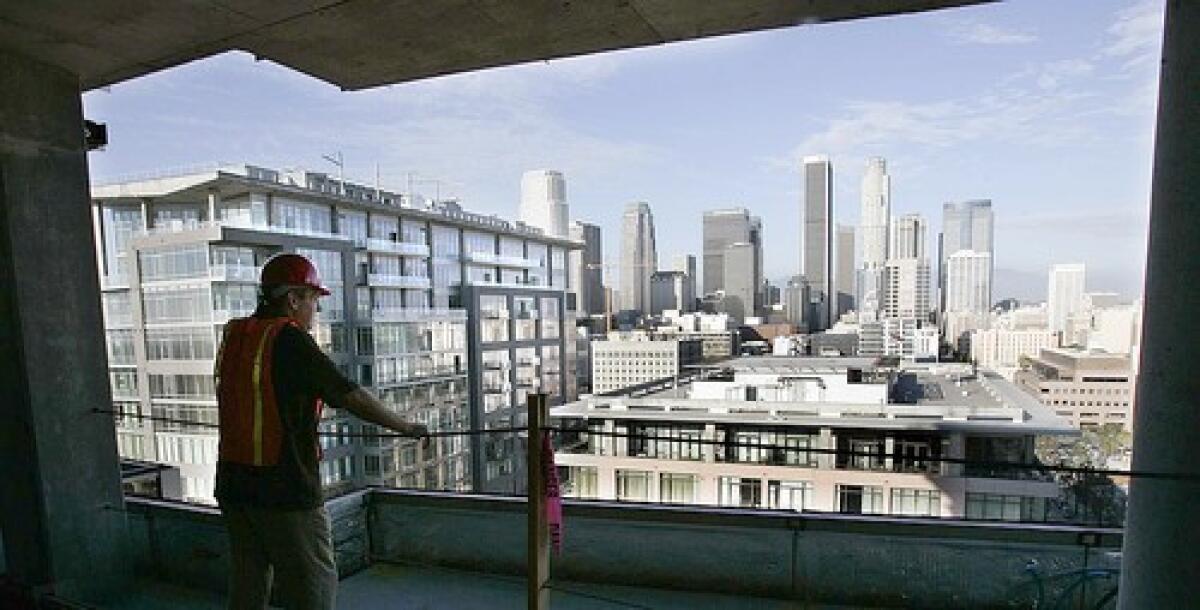Could a vacancy tax help L.A.’s housing crisis? Maybe. But not the version the city is planning

- Share via
When Los Angeles City Council members floated the idea last year of a vacancy tax to discourage property owners from holding empty units or lots off the market, the idea seemed worthy of further study.
Now the studies are back and the council is considering putting the “empty homes penalty” on the November ballot. But the case for the vacancy tax being considered is, well, unpersuasive.
The theory behind the penalty makes sense. The tax could push vacant units onto the market and reduce the shortage of homes. It could also nudge property owners to build housing on their vacant lots or sell them so someone else could develop the land. For those who pay the tax, the money could help fund the construction of more affordable housing.
The problem is that despite months of research, the city still doesn’t have a solid understanding of how many units or vacant lots are being held off the market or, more important, why.
The city estimated that 1 in 10 high-end units is vacant at the moment. That’s about 1% of the homes in buildings with five or more units in the city, according to real estate data firm CoStar.
Is there indeed a glut of empty luxury apartments because speculative investors don’t want to lower their prices? Or are there more vacancies because these are newly built units just waiting to be rented or sold, or sold but not yet occupied? Are wealthy buyers snapping up real estate to park their money without the hassle of tenancy? The reports didn’t answer these questions, so it’s difficult to predict whether the tax will improve the housing market or change property owners’ behavior.
Few cities in the U.S. have enacted vacancy taxes, so it’s hard to gauge their effectiveness. L.A. would model its tax on the one that Oakland’s voters approved in November 2018, but that city hasn’t reported how much the tax is raising yet. Westside Councilman Mike Bonin, who proposed L.A.’s tax, predicts it could provide a huge revenue stream for the city. But would it?
One study estimated the city had between 85,000 and 100,000 empty residential units, but didn’t assess how many of those would qualify for the tax. Another analysis calculated that the city has about 19,000 empty units and 2,900 vacant lots that could be subject to the tax. The proposal calls for an annual tax of $5,000 per residential property and between $5,000 and $40,000 per vacant lot. Reports put the potential revenue at $100 million to $150 million a year, but that was before the City Council carved out numerous exemptions that shrink the number of taxable properties.
For example, the tax would apply only to homes or residential lots that were vacant for more than 10 months of the year. The council also excluded nonresidential commercial properties, properties owned by nonprofits or low-income or disabled people, and properties in the process of being developed, marketed or sold.
In addition, the City Council voted to exempt single-family homes from the tax unless the house is owned by a corporation. And under the Oakland model the council is currently following, multi-family buildings would be exempt if at least one unit in the complex is occupied — exempting all the half-rented luxury buildings that proponents say they want to target.
With all these exclusions, how many vacant units will be left to tax?
OK, you might ask, perhaps this tax proposal won’t have a huge effect on the housing market, but what’s the harm in trying it?
The harm is the possibility that L.A. will squander money and time on a proposal that won’t deliver the housing reform that the city truly needs. It will cost $12 million to put the tax on the November ballot, require a hard-to-reach 66% of the vote to pass, and even if it does pass, may deliver modest revenue and benefit.
L.A.’s major housing problem is not the small number of homes sitting empty. It’s the shortage of housing affordable to middle- and low-income Angelenos. Council members could make a bigger impact if they focused on streamlining the development process and creating programs that incentivize developers to build housing at all income levels.
More to Read
A cure for the common opinion
Get thought-provoking perspectives with our weekly newsletter.
You may occasionally receive promotional content from the Los Angeles Times.









